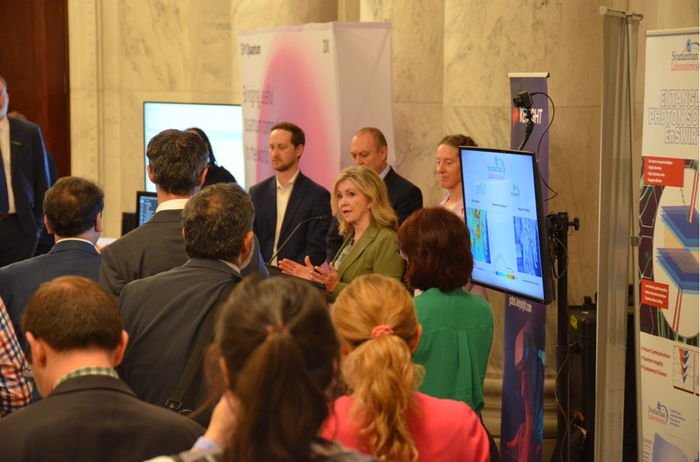
Connects decision-makers and solutions creators to what's next in quantum computing
Industry Reacts to Google’s Quantum Supremacy Claim
Breakthrough raises questions about definition of supremacy and future opportunities and threats

Google recently became the latest organization to claim its quantum computer had achieved quantum supremacy. Researchers published a paper demonstrating that its second-generation 70-qubit Sycamore processor completed a real-life calculation in six seconds that could have taken one of the world’s fastest classical supercomputers 47 years.
Quantum experts were quick to react and offer Enter Quantum their insight about the definition of quantum supremacy and the significance of the breakthrough.
What is Quantum Supremacy?
Clare Walsh, director of education, Institute of Analytics
Quantum Supremacy is the ability of a quantum machine to carry out a task faster and more effectively than through classical computing. However, there are conflicting qualitative views on what that ‘task’ should look like, and what constitutes an ‘effective’ parse over the data.
In one sense, the Google Sycamore processor has proven itself technically capable of working 47 years ahead of a classical machine. But the people invested in quantum computing already come from a range of backgrounds, and not all of them are interested in an engineering proof of concept.
The precise definition of quantum supremacy is a contested field, with some arguing that we can only claim that the entanglement frontier has been passed when quantum machines can solve a real-world problem that we cannot currently address. That is, after all, the promise of quantum technology – that it will save the environment and find sense in petabytes of health data to lead to medical breakthroughs.
It will be up to the historians in the future to identify which breakthrough marked a significant enough step forward to be considered the moment when quantum supremacy took place, not marketing teams with some hype to promote. Historians may choose this event, but in the coming years, we will be refining our definitions of what makes quantum supremacy stable and viable, as emergent issues arise. It is equally possible that this will not be the moment history marks in its calendar.
However, for most of us observing, these arguments are academic and unimportant. What matters is that the breakthrough is notable, and it shows that quantum research is progressing at a steady pace. This technology holds promise in the coming years.
Supremacy is Just a First Step
Jon Morgan, CEO, Venture Smarter
This breakthrough is undoubtedly a significant milestone in the field of quantum computing and has generated considerable excitement within the scientific community. Google's demonstration of its quantum processor's ability to perform a calculation that would be practically impossible for classical computers marks a remarkable achievement.
The concept of quantum supremacy revolves around the idea that quantum computers can solve certain problems exponentially faster than classical computers. This achievement by Google signifies that we are now entering a new era of computing, where quantum systems can provide solutions to complex problems that were previously unattainable. It has the potential to revolutionize various industries, such as cryptography, drug discovery, optimization and machine learning.
However, it is important to note that quantum supremacy is just the first step in harnessing the true power of quantum computing. We are still in the early stages of development, and there are many challenges ahead. Scaling up quantum processors, improving qubit coherence and reducing error rates are critical areas of research that need to be addressed for practical applications of quantum computing.
The announcement by Google researchers also serves as a reminder of the intense competition and race in the field of quantum computing. Several other major players, including IBM, Microsoft, and startups like IonQ and Rigetti, are actively working on advancing quantum technologies. This healthy competition will drive further innovation and accelerate the progress of quantum computing.
From a business perspective, this development underscores the need for organizations to start exploring the potential impact of quantum computing on their industries. While practical applications might still be several years away, it is crucial to stay informed and invest in research and development related to quantum technologies. Collaborations with academic institutions, partnerships with quantum startups, and fostering a culture of innovation will be vital for organizations to stay ahead in this rapidly evolving landscape.
Breakthrough Raises Cryptography Red Flag
Tim Wright, technology partner, Fladgate
Google’s latest attempt to demonstrate quantum supremacy appears to be a significant milestone by demonstrating that quantum computers can solve problems that are intractable for classical computers. This is a major step towards the development of practical quantum computers that can be used to solve real-world problems.
It might also be a leap towards Q-day, the hypothetical future day in the future when quantum computers will become powerful enough to break current encryption algorithms, making it possible for attackers to decrypt sensitive data. Regulators are likely to be watching these developments, maybe even thinking about whether to intervene, perhaps to mandate the use of quantum-resistant cryptography by banks and other financial services firms.
Organizations Need to Prepare Now
Ben Packman, senior vice president of strategy, PQShield
At face value, this certainly appears to be yet another significant advance, firing the warning flags even higher for businesses to bolster their systems in preparation for an increasingly imminent quantum reality. We’ve certainly noticed a rise in commercial demand for quantum-secure cryptography solutions, which we expect to continue growing as companies like Google ramp up the race to quantum supremacy.
Inventory Cryptography to Prepare
Tim Callan, Chief Experience Officer at Sectigo
Quantum computing continues to develop at a rapid rate, with milestones like the one recently claimed by Google showing the inevitable progress to the day when quantum computers break our popular encryption algorithms.
New ‘post-quantum cryptography’ algorithms exist today, and standards bodies are busy getting us to the point where we can begin their widespread use. Organizations are well advised to continue inventorying their cryptography and implement certificate automation functions, so they are prepared for the wholesale changeover to post-quantum cryptography once systems are ready.
About the Author(s)
You May Also Like
.png?width=100&auto=webp&quality=80&disable=upscale)
.png?width=400&auto=webp&quality=80&disable=upscale)




